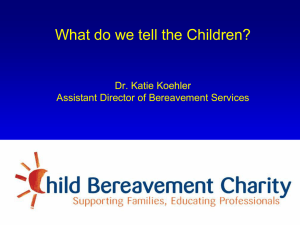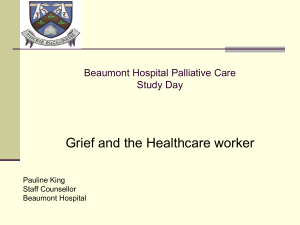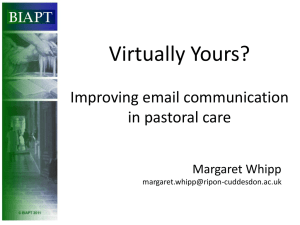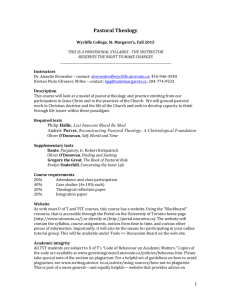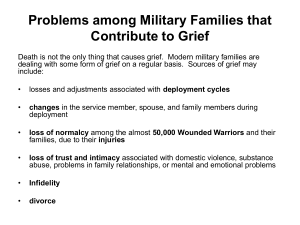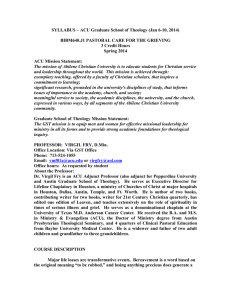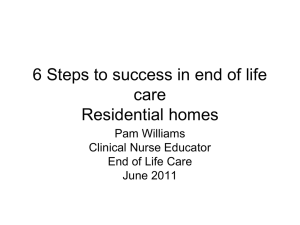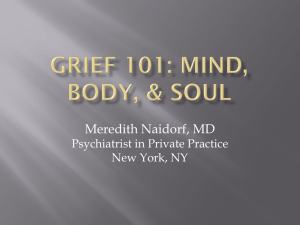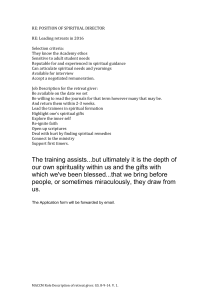Supporting bereaved families2 - Paediatric Chaplaincy Network
advertisement
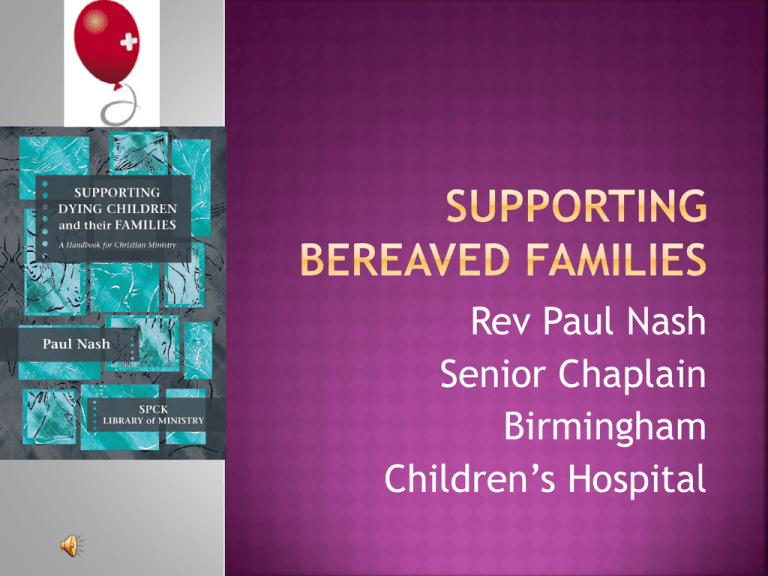
Rev Paul Nash Senior Chaplain Birmingham Children’s Hospital Savour not just take notes Stories from families Background information Religious, spiritual and pastoral care Bereavement theory Practical care Theological reflections Let the families help us Listen to our stories, be there for the long haul and continue to talk about our child. There's an elephant in the room You can’t, but that’s okay. I’ll never find a reason why she died, but there is a reason why she was alive, but it is not yet all clear why. It is hard enough, you drive yourself mad finding an answer, a reason. But this is hard. Louisa’s mum Hard letting anything else but grief into my head. (Louisa’s mum) Grieving is hard work, exhausting in fact, and any supporting measure is greatly welcomed by the bereaved.(Dylan’s family) My auntie wrote us a letter which was a real comfort to both of us. One of the things she wrote was: ‘There are so many clichés that people come out with at times of illness or death, and while you know many of them they are not what you want to hear right now. You must grieve in your own way, both individually and together, and whatever emotions you feel, from sadness to anger, it’s okay. God understands. Even though Joshua had only a short life you must have precious memories which you will always treasure. Hang on to those. Each day in prayer I thank God for the continued unbroken link which we still have with our departed loved ones through Him. We take comfort from the fact that we can indeed talk to God, the One who is caring for them now and beneath whose gentle, tender love and care they are not lost at all but are now safe, truly safe, safe from all harm and suffering. Furthermore, because above all things God is love, it most surely then must follow that someday we’ll meet and be reunited with them again. Grandparents: double triple grief Siblings: be honest, be literal “We allowed Connor to see Lauren in the Chapel of Rest the day before the funeral and he came to the funeral, as he had asked to do both. He was only five and a half, but I worried that his fear of the unknown would be worse than actually seeing the reality. Five years on and I am glad we made that decision as he had his chance to say goodbye”. Key times: anniversaries, birthdays, Christmas When and how to refer When it is Josie’s birthday we buy colourful candles and they are lit all day; we buy balloons and release them. We also do the balloons at Christmas. Our son got very upset when he had his fourteenth birthday as he was very aware that his sister never made it to this age. Lauren loved dogs so we sponsored a guide dog for the blind for her third birthday, two months after she died. We also planted a cherry blossom tree in our garden which blossoms around her birthday. We still bring Lauren back a present from holiday, like a snow globe. What we do is let the people who mattered to Tabea go up to the grave with us. We then sing ‘Happy Birthday’ or carols or whatever is appropriate for the occasion, then we decorate her ‘garden’ with the little gifts that everyone has brought with them, ensuring that all get involved who wish to. For Kofi's birthday we always celebrate by going out for a meal where we used to take him and by visiting the National Memorial Arboretum to see his tree Skylark sing, All day long Day not long enough Sense of injustice Not natural / normal / the way it is supposed to happen More hopes and dreams are gone Do not try and rescue Do not feel you must have all the answers “I am sorry for your loss” Be courageous, name the name of the child Befriend death Skills – Attitudes – Knowledge – Ethics Theological integrity : pastoral expediency What to say Be creative Self care It does not help the journey. Walk slowly, pausing often. Do not hurry as you walk with grief. Be not disturbed by memories that come unbidden. Be gentle with the one who walks with grief; if it is you, be gentle with yourself. Swiftly forgive, walk slowly, pausing often. Take time to be gentle as you walk with grief. Heard reflections 1. God made the world and is in control. 2. Therefore, everything that happens in this world is what God plans, wills or desires. 3. Therefore, my child dying is God’s will, because God knows what he is doing and knows best. Or 1. My child is dying, has died. This is not good. 2. Life goes on, and in due course good things come out of the death of my child: I grow; I appreciate things I would not otherwise appreciate; others are changed because of my child’s life; I learn things I would not otherwise have learnt. 3. Therefore, it must have been God’s will, plan and divine purpose that my child has died. Or 1. Life is supposed to be fair. 2. What is happening to my child is not fair. 3. Therefore, God is not being fair with my family. 4. God is not the friend of our family. Healthy equation God loves your child and your family. God is for you, not against you. God is with you and has not abandoned you. God created a world and humanity with choice and consequences. There are other factors at work. This illness is not a judgement from God. This illness is not a test from God. It is not just a matter of finding the right amount of faith or the right prayer – there are no formulae. God did not plan this. God is outside of our time frame and there is a difference between knowing and determining. Not everything that happens in our world and our lives is what God wants or desires. We have a redemptive faith that can bring good out of bad, negative, evil situations. In the end, when all is said and done, we do not really understand suffering. Redemptive not planned 1 I will take time to listen to the story and experience of the family. I will seek to build a relationship of mutual trust. I will ask, not assume, and will seek permission. I will honour and respect. I will not abuse my power. 2 I will be confident in and cultivate who I am, to and around children and their families, remembering that this is more important than what I say. The type of person I want to be is gracious, generous, patient, compassionate, kind, courageous, honest, helpful, empowering, being compassionate first and last. I will follow prompts, be bold yet gentle, minister with intentional availability and vulnerability. I will draw upon God’s gifts of discernment and wisdom in how to respond. 3 I will be a minister of presence, comfort, peace, hope, redemption, forgiveness, resurrection and mystery. 4 I will befriend death and be more comfortable around dying children and bereaved families, being willing to name the elephant in the room. I will be a channel of appropriate hope. 5 I will have a care plan to keep in touch with the family and will not avoid them. I will not be debilitated by a fear of saying the wrong thing. I will create space and give permission for questions, doubts and concerns. I will not be formulaic in caring, realizing that families will differ in how they process their anticipated or realized loss, but also that there are patterns in grieving. 6 I will be creative in my care, liturgy and rituals. 7 I will offer or facilitate practical help such as shopping, cooking, attending appointments, registering the death, etc. 8 I will be aware of the tension between pastoral and theological integrity and expediency. Sometimes being pastorally and theologically expedient is good theology and pastoral care. 9 I will fight the natural tendency to make sense of what has happened right this minute. 10 I will offer support and, if needed, give permission that a new normal life is achievable and acceptable. 11 I will look after myself and value my role as part of a multidisciplinary team. I will be reflective, self-aware, honest with myself, mindful of triggers and willing to refer when necessary. 12 I will relax. There is nothing I might say that is worse than what has already happened. Be mindful of meeting different types of care: religious, spiritual, pastoral and cultural. Don’t feel you always have to speak or have the answers. Words are a blunt instrument. And sometimes all we have is ‘I am so sorry for your news, for your loss.’ It is up to the family to make sense of their pain. It is not the role of the professional to do it for them. Fight the natural tendency to make complete sense of the situation. Don’t redeem too quickly. Be both pro- and reactive in your care. Speak to and encourage others to talk to the child, regardless of the level of consciousness. Use the child’s name and be aware of his or her humanity. Be inclusive of all members for the family. Include those who may be disenfranchised and try to engage with all ages. Don’t take the expressed emotions of the family personally or permanently. Don’t get drawn into protecting or defending the reputation of God. Where appropriate, reframe the question to look at what God is like. Pray with wisdom and discernment, and be aware that what you can always pray for is God’s peace, strength and perspective for the children and the families. Seek to act ethically and with integrity, and be willing to help families explore ethical issues that may be involved in their situation. Be aware of the procedures leading up to, at and after death, including understanding care pathways, so that you can give the family appropriate support. 1. 2. 3. 4. 5. 6. 7. 8. 9. 10. Bereavement is only one type of loss that families may be going through. Grief is usually a spiral, not linear – a whirlpool is complex. Families do become experts in caring for their child, and we can learn from them. Our pastoral care reveals our theological hands. Individual family members will respond in different ways and heal at different rates. Loss will often be felt way beyond the family. Dead children do not trump everything, although it is an immense tragedy to lose a child. It is important to articulate our own values. Mine are that the best interests of the child – the needs of the child – should always be at the centre of the care within the family. Be honest, even when it’s painful. Be present: we must make ourselves sacrificially available. Be an agent of peace and hope. 1. 2. 3. 4. 5. 6. We asked families to tell us their top tips for professionals seeking to work in palliative and bereavement care. This is what they recommended: Listen to our stories, be there for the long haul and continue to talk about our child. Offer help with the practical things of life like shopping or picking up children from school or cooking a meal, and just drop in and visit to help us avoid feeling isolated. It helps to be reassured that our child is no longer in pain because as a mother I always want what is best for my child. It helps to know that God understands how we feel. Our memories are really important for us to hang on to. Where possible facilitate the creation of memories through rituals. Be willing to keep listening to our memories. It can be really helpful to come to memorial services, both for us as families but also for our or our child’s friends, as it enables us to continue to show our love for our child. Having our child’s name in a remembrance book is a comfort too. If there was one word to sum up everything else it is this – listen. As the years go on, please don’t forget us. Even if you’ve not seen our faces for a while, our lives will never be the same again. There will always be someone missing and there will always be something special about you who cared. (Tabea’s family) As the years go on, please don’t forget us. Even if you’ve not seen our faces for a while, our lives will never be the same again. There will always be someone missing and there will always be something special about you who cared. (Tabea’s family) Phase Engel (in Speck, 1978) Kübler-Ross Bowlby 1 Denial Denial Numbness 2 Developing awareness Rage and anger Bargaining Depression Pining Disorganization 3 Resolution Acceptance Re-organization

